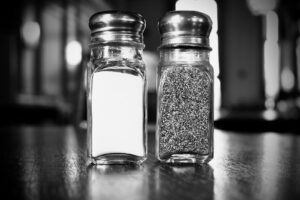
How to Say Something Is Free in English
The word “free” usually gets people’s attention quickly! But do you know how to say that something is free using...


How to Use "Play" Like a Native Speaker


How to Talk About Hot Weather in English


Topic Focus: Super English Words


Everyday English Abbreviations You Should Know


How and When to Use the Passive Voice
Most of the English you speak is probably in the active voice. That’s a good thing because the active voice...


More Than Romance: 14 English Idioms Related to the Heart
Our hearts are responsible for pumping blood through our bodies. And as a symbol, they represent feelings of love and...


How to Use "Like"…Like a Native Speaker
Most students learn the basic meaning of "like" early in their English study. But this simple word can be used...


"Its" and "It's": What's the Difference?
Many English words sound the same, and when you're speaking, you can often ignore their similarities. But when you're writing,...


How to Use "Big" Like a Native Speaker
"Big" is probably one of the first words you learned when you began learning English. It expresses a very simple...


Topic Focus: English for Food and Drink
Everybody loves food. Some people travel around the world just to try different countries' special dishes and unique flavors. We’ve...


What Does "-Ish" Mean and How Do You Use It?
There are lots of times when we don't want to say something in a precise or exact way. Instead, we...


How to Use "Literally" Accurately!
It’s very common to hear English speakers use “literally,” often when telling an interesting or funny story. However, it’s also...


How to Use Countable and Uncountable Nouns
English learners often have trouble understanding countable and uncountable nouns. It can be tricky, but knowing the difference is important....



"What's Up?": How to Use It and Respond to It
"What's up?" If you have English-speaking friends or watch English TV and movies, you've probably heard this expression before. Even...
!["How Far" and "How Long": What's the Difference? [Updated] "How Far" and "How Long": What's the Difference? [Updated]](https://assets.blog.engoo.com/wp-content/uploads/sites/9/2022/05/10083515/how_far_long_difference-300x200.jpg)
!["How Far" and "How Long": What's the Difference? [Updated] "How Far" and "How Long": What's the Difference? [Updated]](https://assets.blog.engoo.com/wp-content/uploads/sites/9/2022/05/10083515/how_far_long_difference-300x200.jpg)
"How Far" and "How Long": What's the Difference? [Updated]
"How far" and "how long" may sound the same to many English learners, but each has a specific meaning and...
![The Many Meanings and Uses of X [Updated] The Many Meanings and Uses of X [Updated]](https://assets.blog.engoo.com/wp-content/uploads/sites/9/2023/08/22034748/meanings_and_uses_of_x-300x200.jpg)
![The Many Meanings and Uses of X [Updated] The Many Meanings and Uses of X [Updated]](https://assets.blog.engoo.com/wp-content/uploads/sites/9/2023/08/22034748/meanings_and_uses_of_x-300x200.jpg)
The Many Meanings and Uses of X [Updated]
X is one of the most powerful letters in the alphabet. From math to maps, and from voting to kissing,...


The Ultimate Guide to Using "Can" and "Be Able To"
Though similar, "can" and "be able to" are different in three important ways: This post will explain each of these...



"What's Up?": How to Use It and Respond to It
"What's up?" If you have English-speaking friends or watch English TV and movies, you've probably heard this expression before. Even...


Why Native English Speakers Say "Have" When They Mean "Eat"
Has a waiter ever asked you “What will you have to drink?” Or have you ever heard a native English...
!["Used To" / "Be Used To" / "Get Used To": What's the Difference? [Updated] "Used To" / "Be Used To" / "Get Used To": What's the Difference? [Updated]](https://assets.blog.engoo.com/wp-content/uploads/sites/9/2023/05/02080148/used_to_cover-300x192.jpg)
!["Used To" / "Be Used To" / "Get Used To": What's the Difference? [Updated] "Used To" / "Be Used To" / "Get Used To": What's the Difference? [Updated]](https://assets.blog.engoo.com/wp-content/uploads/sites/9/2023/05/02080148/used_to_cover-300x192.jpg)
"Used To" / "Be Used To" / "Get Used To": What's the Difference? [Updated]
By itself, "use" means "to put into action for a specific purpose." But when you add "to," it becomes a...


Collocations: Word Pairs for Natural English
"Quick food"? "Do a test"? "White and black"? Do these phrases sound strange to you? If they do, then you...


How to Use "You Know" Like a Native Speaker
If you watch English-language TV or listen to native speakers in a casual conversation, one thing you will definitely hear...


How to Use "Enough" Like a Native Speaker
"Enough" is used often in daily conversations, so understanding its different forms will give your English fluency a big boost....


"Me Too" and "Neither Do I" - A Quick Guide to Agreements
Many English learners know that "me too" is a simple and easy way to agree with someone. However, they may...
